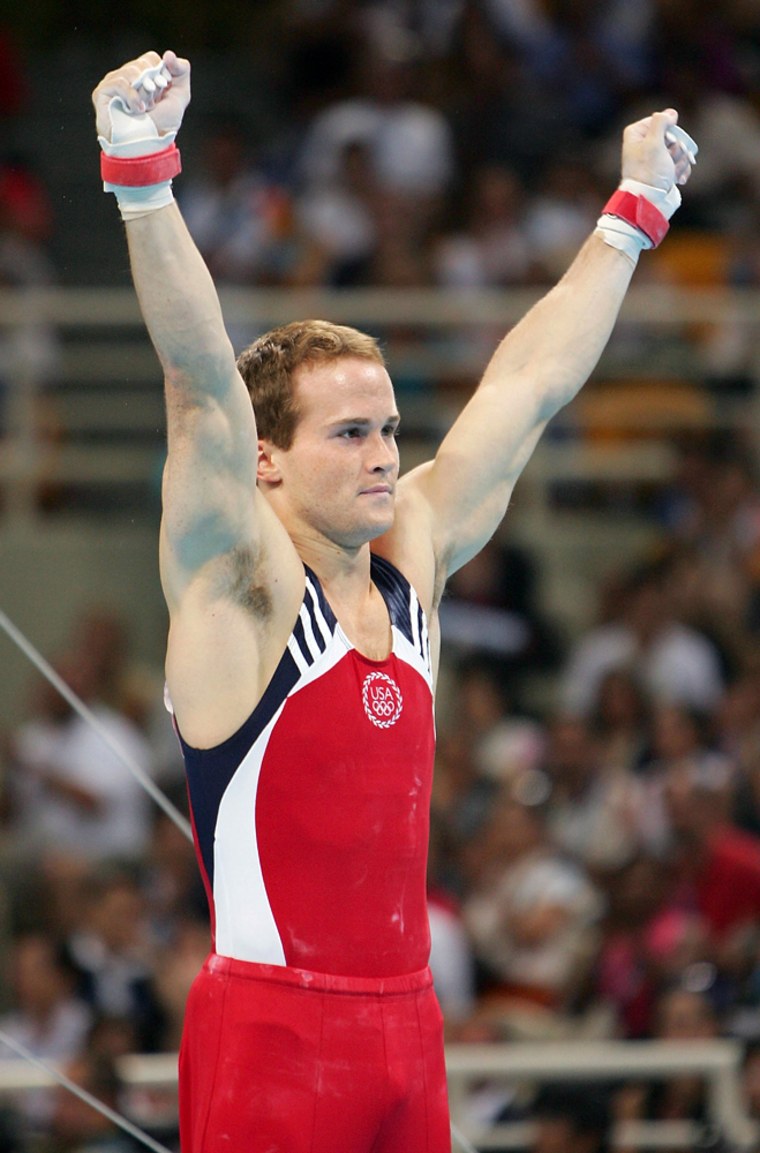The U.S. men are heading to the Beijing Olympics, their eyes still on the medals podium.
Without reigning Olympic champion Paul Hamm, though, getting there is going to be a lot tougher.
"We all know we have work left to do," Olympic coach Kevin Mazeika said.
The Americans were fourth at last fall's world championships, three missed routines from the bronze medal. Though only two members of that squad are back for Beijing, the U.S. men were confident they were better, sure to be medal contenders. Maybe not the gold, for which China is the heavy favorite, but certainly the silver or bronze.
That, though, was before Hamm withdrew from the U.S. team Monday, saying he wouldn't be healthy enough to compete in Beijing. Hamm still is feeling pain in the right hand he broke on May 22, but the bigger problem could be a strained rotator cuff in his left shoulder.
Raj Bhavsar, picked to replace Hamm, is one of the Americans' best on rings, parallel bars and vault, and consistency won't be an issue on any event. But because of gymnastics' complicated scoring format and Hamm's all-around superiority, every one of the U.S. men is going to have to step up.
Irreplaceable
Even then, it might not be enough.
"Obviously an athlete of Paul Hamm's level is irreplaceable," Mazeika said. "We move on to the next step and look at how to field the very best team on the floor to optimize our team score."
In qualifying, teams compete five gymnasts on each event and count the best four scores. That means they need four guys on every event who will be consistent and contribute high scores — not as easy as it sounds when you consider some gymnasts only do three or four events.
Morgan Hamm, for example, doesn't do still rings or parallel bars, while Kevin Tan stays off floor and vault. Justin Spring doesn't do pommel horse. Joseph Hagerty's weakest event is rings, but he'll have to go in qualifying.
Once a team gets to the finals, only three gymnasts compete on each event and all three scores count. With so little room for error — fall or botch a routine, and someone else is leaving with your medal — teams need gymnasts who can put up a blockbuster score and not screw it up.
Had Hamm been healthy, the Americans would have used him on all six events in qualifying and, likely, team finals. Bhavsar is an easy replacement on rings, vault and parallel bars, where his scores are close to Hamm's.
Floor exercise is manageable, too. If Hagerty, Spring, Morgan Hamm and Jonathan Horton hit their routines, the Americans have the scores they need for both qualifying and team finals. Ditto for high bar.
Need for consistency
But pommel horse, long the United States' weakness, could be trouble.
Sasha Artemev was the bronze medalist at the 2006 world championships, but he was doomed by consistency problems at nationals and the Olympic trials (he botched three of his four routines) and is an alternate. Of the top six at nationals and trials, only Morgan Hamm is going to Beijing, and his best score is probably going to be around a 15.
Compare that with the Chinese, who have three gymnasts who can put up a 15.4 or better. Or Romania, which has two athletes who can score 15.4 or higher.
"We already knew this team was great on floor exercise and high bar, and I don't think this changes that," Bhavsar said. "Pommel horse, I believe we just need three consistent scores. Rings is still stacked, vault is still stacked and parallel bars is very much stacked."
There was also the psychological edge Hamm gave the Americans. He is the only American to win a world (2003) or Olympic (2004) all-around title, and is as fierce a competitor as you will find anywhere in the world.
"You walk out on the floor, and other countries look at our team and that's intimidating because it's Paul Hamm," Horton said before Hamm got hurt in May. "They might not say it, but they know it."
But the Americans insist Hamm's loss didn't sap them of all their swagger. They still have Morgan Hamm, an Olympic silver medalist and one of the world's best on floor. They still have Horton, who missed the all-around bronze by a mere 0.2 points at last year's worlds, and Tan, who was fourth on rings.
Bhavsar is no slouch, either, a member of the United States' silver medal teams at the 2001 and 2003 world championships.
"Paul at his best is irreplaceable. But I believe in my heart that the team goal is the same, and it's definitely within our potential," Bhavsar said. "This is a tricky format (in team finals), and anything can happen. Things can absolutely work out in our favor.
"We're not ever going to give up on that dream."
